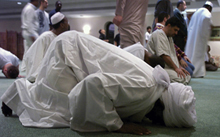Muslim holiday teaches followers self control


Courtesy bestourism.com
Jalal Ahmed of Western Hills prays before group prayer led by Sheikh Saad at Flint Islamic Center in Clayton Township on the start of Ramadan, where Muslims fast for 30 days with prayers and almsgiving — a giving to the poor or less fortunate.
Eid ul-Fitr began Tuesday, Aug. 30.
“This marks the end of Ramadan,” said Muhammed Al Kahtani, a teacher at the Islamic Society of Greater OKC.
“Practicing Muslims fast for 30 days, and on the holiday of Eid ul-Fitr we pray in the morning and have a big feast with family and friends afterwards.”
Al Kahtani, 52, has been a practicing Muslim his entire life. He was raised in Saudi Arabia and came to Oklahoma 30 years ago where he started a family and now works at the Islamic Society.
“I have fasted since I was very young,” Al Kahtani said. “It’s not very difficult, especially when you know you’re doing it for Allah.”
According to Al Kahtani, it is “mind over matter.”
“I say prayers five times a day all throughout the year. It can be challenging to plan a day around it, but it is necessary.
“Ramadan feels like a spiritual journey, a change which inshallah (God willing) will last. Ramadan has taught me something extra special — that this life is too short wasting it disobeying Allah.
“Lastly, it has made me feel for the first time in my life the sweetness of imaan; the delights of being a believer over a disbeliever,” he said.
“To me, Islam is a way of life and it’s not a religion but a message delivered to Prophet Muhammad.”
Al Kahtani said the Quran is a guide to fulfill the duties of the previous religions — to fulfill their rights and duties and seal the whole mission of Prophet Muhammad.
“Hence, there is no more guidance to come after this and that’s what a Muslim means to me, one who submits to the will of Allah and has the yakeen (belief) in his heart that Islam was there from the beginning till the end,” he said.
Ghazala Ahmed, 16, is a student at the Islamic Society.
“My family is Pakistani and we always have family members and close family friends over for Eid ul-Fitr.
“We have a lot of food, and hang out all day and think about the deed we just completed for Allah,” Ahmed said.
Islam is a religion practiced over a vast amount of countries.
Just like some Christians do not observe Christmas, some Muslims do not observe Ramadan.
Amin Shariat Zadeh, OCCC’s Communication Lab assistant, said he was born and raised in Iran as a Muslim.
Zadeh said he no longer practices Islam; therefore he does not observe Ramadan.
His family is still religious, he said, but they also do not practice Ramadan.
“As I studied, a lot of things didn’t make sense to me,” Zadeh said. “I think that religions are important from an anthropology and history point of view, but as faith, I do not believe in worshiping.
“I have a problem with the worshiping and the all good entity that people call God.
If he’s all good, why does evil exist? It’s not convincing to say there’s a heaven and hell. It just doesn’t make sense to me,” Zadeh said.
According to Travel Snitch the start of Ramadan shifts by approximately 11 days on the solar calendar each year. In 2012, Ramadan will begin July 20.
To learn more about Ramadan, visit www.travelsnitch.org.
To contact Sarah Hussain, email staffwriter3@occc.edu.